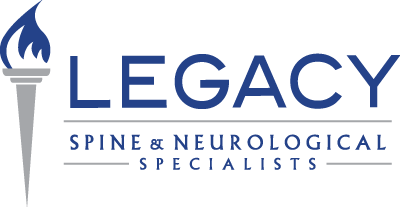Legacy Neurosurgery
Legacy Neurosurgery aims to provide patients with life-changing care through today’s leading surgical treatments. Our experienced team offers comprehensive care for patients with spinal and disc conditions, disorders, and peripheral nerve conditions—from minimally invasive spinal intervention, injection procedures, and conservative modes of therapy to state-of-the-art neurosurgery.
Our Approach
We specialize in non-operative spinal procedures and outpatient cervical and lumbar spine surgery, and always take the least invasive route possible for each patient. Preferably, we avoid any type of surgery if at all possible. When surgery is necessary though, we always opt for the most minimally invasive procedure. We even adapt minimally invasive surgery (MIS) techniques commonly performed on the brain for the spine, a unique, innovative approach few other neurosurgery practices utilize. MIS is always chosen over traditional surgery because of the range of benefits it provides to the patient, including but not limited to: reduced blood loss, a faster healing process, less tissue damage and higher likelihood the surgery will be completely outpatient or accompanied by a reduced hospital stay.
The MIG-LIF
Our experienced neurosurgeons lead the nation in the development and advancement of computer and image-guided micro spine surgery. The Legacy Spinous Process MIG-LIF procedure, developed by our neurosurgery team to treat lumbar stenosis/instability, is one of the most advanced and innovative MIS lumbar fusion procedures in the world.
This technique utilizes navigation/image guidance and a single midline incision of 15-20 mm to achieve direct decompression and instrumentation to relieve this debilitating pain. In comparison, the incision size for a traditional spinal fusion can exceed 75 mm. Our keyhole access surgery allows for less tissue disruption which permits single level fusions with low co-morbidities to be performed on an outpatient basis.
This surgery is often performed outpatient or with shorter hospital stays allowing for quicker recovery time, reduced post-op pain, lower risk of MRSA infections and lower costs.
In a retrospective clinical study, 40 patients suffering from degenerative disc disease who tested positive for radicular pain and segmental instability were treated using the Legacy Spinous Process MIG-LIF procedure. All 40 patients were successfully discharged the same day of surgery. Hospital stays associated with traditional spinal fusions are, on average, between 3-5 days.
Click here to read details about the MIG-LIF.
Watch the MIG-LIF Patient Education video and the Patient Testimonial video.
Why A Neurosurgeon Is The Smart Choice For Your Spine
Neurosurgeons and orthopedic surgeons are both typically certified to perform spinal surgery, making it difficult for patients to decide which specialty best addresses their issues. More often than not, a neurosurgeon is the optimum choice when dealing with spinal issues, as the brain, spine and nervous system are the sole focus of our medical training, where orthopedic surgeons are trained to care for the entire musculoskeletal system.
In fact spine surgery patients that choose to be treated by an orthopedic surgeon are more likely to:
- Endure a longer hospital stay
- Experience complications from surgery
- Need continued care post surgery
- Require a perioperative transfusion
Read more about this subject here.
- CONDITIONS WE TREAT
- EVALUATIONS & TREATMENTS WE PROVIDE
- Carpal tunnel
- Degenerative Discs
- Herniated Discs
- Low Back Pain and Neck Pain
- Pinched Nerves in the Spine/Radiculopathy
- Pituitary Tumors
- Spinal Stenosis
- Spondylolisthesis
- Trauma
- Trigeminal Neuralgia
- Ulnar nerve
- Epidural Steroid Injections
- Facet Injections
- Microscopic spinal decompression and discectomy
- Microscopic minimally invasive brain surgery
- Minimally invasive computer-navigation assisted spinal fusions and instrumentation
- Minimally invasive peripheral nerve surgery (including carpal tunnel surgery and ulnar nerve surgery)
- Nerve Root Block
- Non-narcotic medical management
- Percutaneous facet rhizotomy
- Percutaneous spine surgery
- Percutaneous vertebral augmentation (including vertebroplasty and kyphoplasty)
- Stereotaxic radiosurgery

